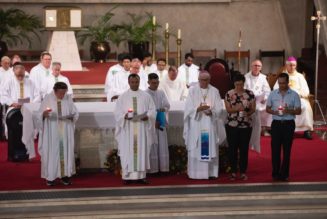Okay, okay, maybe it’s partly the reverence. But hear me out.
In all of these endless conversations about the Mass in the current day, “reverence” would probably win the Word Cloud competition.
They just want a reverent Mass!
Celebrated properly, the Mass of Paul VI can be plenty reverent!
Give us reverence!
Well, I think “reverence” as an interpretive lens falls short. I don’t think it quite gets to the core of the problem.
It’s not the reverence.
It’s the ego.
Because the ego lies at the heart of the “irreverence” – no matter what form that “irreverence” takes – and we obliged to note that a full-on Latin Mass in whatever form can be “irreverent,” too – although the potential for irreverence there has built in boundaries: Latin, strict rubrics.
But let’s look at the Mass of Paul VI – the Ordinary Form, the Mass most of us attend.
I’m going to suggest that the core of what drives people crazy (in a bad way) about the celebration of this Mass is the always-present-fear that when you open the door and sit down in that pew, you are never quite sure if what’s about to happen might involve you being subject to surprise attacks and being held hostage by someone’s ego.
You go to Mass with your hopes, joys and fears. You’re there carrying sadness and grief, questions, doubts and gratitude and peace. You’re bringing it all to God in the context of worship, worship that you trust will link you, assuredly to Christ – to Jesus, the Bread of Life, to His redeeming sacrifice. That in this moment, you’ll be joined to the Communion of Saints, you’ll get a taste of the peace that’s promised to the faithful after this strange, frustrating life on earth is over.
And what do you get?
Who knows. From week to week, from place to place, who knows.
Who knows what the personality of the celebrant will impose on the ritual. Will it be jokes? Will it be a 40-minute homily? Will it be meaningful glances and dramatic pauses? Will it be the demand for the congregation to repeat the responses because they weren’t enthusiastic enough?
Who knows what the particular tastes and artistic stylings of the musicians will bring to the moment?
Who knows what the local community, via committee or fiat, will have determined we should focus on this week?
The idea was this:
God is in the here and now, and speaks to us in the here and now. To be responsive to the Spirit in this here and now means not being bound by imposed ritual or words, especially if those rituals come to us from distant times and cultures.
So what needs to happen with liturgy is that it should be seen as a framework – valuable, yes – but only a framework in which the ministers and the community can respond to the Lord freely, letting Him work through the uniqueness of this particular community, this moment in time, the unique gifts of these ministers and perceived needs of this community.
It was supposed to render the ritual far more accessible than any medieval, time-encrusted form ever could for Modern Man.
It seemed to make sense at the time.
And in the best of circumstances, saints at the helm, perhaps it does.
But as I have said time and time again, one of the reasons we say that tradition possesses a sort of wisdom is that tradition has seen the strengths and weaknesses of human nature and evolved to take that – especially the weaknesses and the sinfulness – into consideration, evolving into something that discourages and inhibits those sinful tendencies
So when you have a liturgy, you have ministers. You have people in charge. And it is not shocking at all that in a context of being told that The Spirit will work through your words and actions – trust it – you immediately construct a huge, boundless playground for the Ego.
The Ego that at one point might have been constrained by strict rules about obeying rubrics, not to speak of the use of a foreign, non-vernacular language, is unleashed, not only by the fateful “in these or other words” – but by his new role, in constant dialogue with the congregation, who now spend an hour or more gazing on his face, and who has been taught that, in some crucial way, the congregation’s spiritual experience at this liturgy depends on his personality – that his personality and interaction holds a key to a fruitful spiritual moment.
But there’s more.
One of the stated purposes of the conciliar liturgical reforms (growing from the Liturgical Movement) was to help the faithful see the sacredness of the moment – by breaking down the wall between the altar and the pews, that would work to help the faithful bring the sacrality found in worship out into their individual lives and the present moment. Again, how much more impactful on this score is liturgy that reflects the current moment in that community’s life rather than something that reflects the experiences of 16th century hierarchs?
How does this work out in real life?
Well, in real life, this grand theory is put into practice by a small group of people – depending on place and time – celebrants, lay ministers, worship committee, musicians – who are operating out of a set of perceived needs and agendas – theirs. It can be little else. Oh, some people have a more expansive vision, but most don’t.
And of course, these people in charge of liturgies are human beings.
How many times have we seen this, in liturgies and in general church life, when leaders, both lay and clerical, have centered their efforts, words and plans on particular agendas and causes, while in front of them sits a congregation gathered with their broken hearts, fears about life and death and all of it, addictions, disappointments, temptations, frightening diagnoses and exhaustion – wondering why they can’t just pray?
To me, it’s an interesting extension of the post-Enlightenment centering of human experience in the cosmos. In a Catholic context, it took different forms, as theological and spiritual thinkers cycled through various angles and anthropologies over the past two centuries, all of which prioritized human experiences of the present moment as the portal to truth and authenticity.
The trouble is – well, one of the troubles – is that given the opportunity, human beings, especially human beings given positions of power and leadership, and encouraged to let the Spirit speak through the present moment and the uniqueness of their own experience, will do just that – imposing their own understanding of the needs of the present moment on the community as normative and fundamental, using the call to inculturate as an invitation to construct a narrative that serves their own purposes and concretize an agenda when all we really came for was the Creed.
Facing us, speaking our language, trusted by us as the arbiters of the moment in which the Spirit is surely moving – yes, the Egoist, given the chance, will certainly and dutifully embrace the moment and center personal experience as way to authenticity and truth – theirs.
Join Our Telegram Group : Salvation & Prosperity








